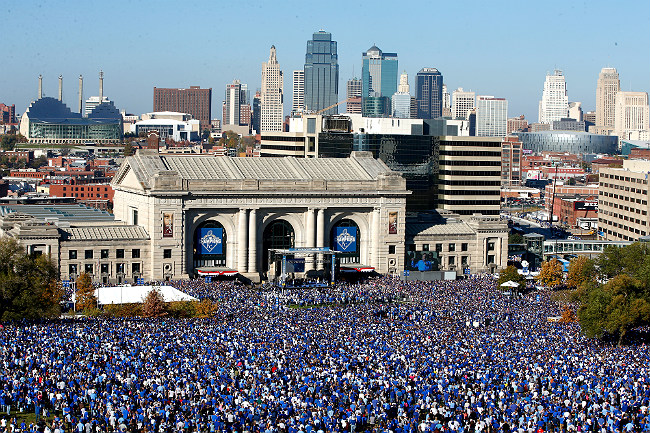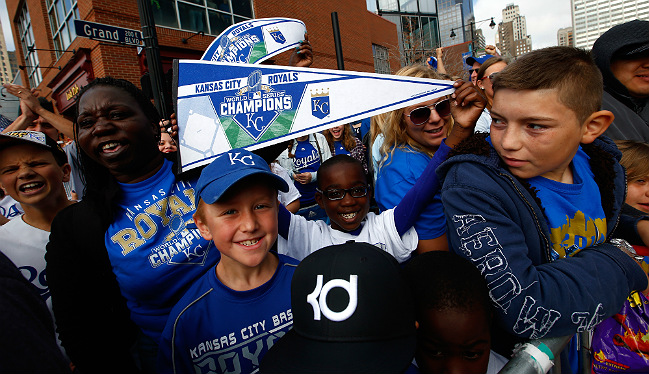
Last year, while working on a story, I asked Matt Besler, Sporting Kansas City’s star defender and a Kansas City native, whether Sporting’s success — and lack thereof for the Chiefs and Royals — had a hand in its city-wide popularity.
He said, “well, look what the Royals are doing right now,” as a way to say that Sporting wasn’t really the only successful franchise in the city. At the time, the Royals were in the midst of an incredible surge through the standings, clawing their way into the playoff picture. It was a fair point, and I nodded; what I really wanted to say was, “Come on. We’re both from Kansas City. We know this isn’t going to last. Obviously.”
* * *
It lasted. Somehow, someway, it lasted — until we needed it the most. Alex Gordon was 90 feet from the tying run in Game 7 of the 2014 World Series, and there he stayed as Madison Bumgarner, the devil in orange clothing, made mincemeat of Salvador Perez.
That would be it, the end of our 30-year karmic buildup. So long, Royals. It was cute and fun and all, but it’s time to go back to the dregs of the league where you belong. Bye, Kansas City, here’s a pat on the head and a lolly, hope you had fun in the spotlight, now be a dear and go back to being the quiet flyover city.
The thought that the Royals were more than just lucky — though they were that — but actually good, that they’d even back in the playoffs, much less the World Series, never crossed my mind.

You have to understand, this doesn’t happen. For my entire life, the Royals have been some form of terrible. There were 100-loss seasons, star players bolting for greener pastures, blundering managers, a putrid owner, everything. Even when something good happened, it seemed to only further illustrate the misery of the Royals. Zack Greinke won the Cy Young in 2009 despite a meager 16-8 record. If the Royals had sported even an average defense, he would have won over 20 games. We could never have nice things. Not for long, anyway.
So you’ll forgive me if I approached this season with more than a bit of skepticism. Even as the Royals emerged as one of the best teams in baseball, even as our pitching continued to stifle opponents, even as Mike Moustakas and Eric Hosmer racked up RBI after RBI — it was difficult to believe this was more than luck, or worse, just a setup for an even more miserable failure. It took until the playoffs for me to reconcile this new reality — the Royals being an Actual Baseball Team — with my old one, and even then, my grip was tenuous at best.
I thought going to Game One of the 2014 World Series with my dad and my sister was a once-in-a-lifetime opportunity. A year later, I found myself back with my dad, in nearly the exact same seats. This time, the Royals won, coming from behind in what has proven to be the Royals way. I was ready for the collapse, for the story to end as it always had, except it never came, because this was an entirely different story, one that ended with the Royals winning the World Series in five games. No matter how many times I type that or say it out loud, it still doesn’t sound right. It sounds wonderful, just not right, at least not yet.
* * *
There’s a video floating around the internet. It shows the cafeteria of Pembroke Hill School in Kansas City, Missouri. An assistant principal is standing in the center, addressing the students. He tells them there’s a chance of snow. Blue snow, to be exact. And he doesn’t want the kids or their parents to drive in it, so they’re canceling school. It takes a split second for the students to get the hint, but when they do, their excitement shakes the camera.
I sat in that exact same cafeteria (although, wait a second, they moved the dessert tray and that condiment station is new), for seven years. The only monumental announcement I can remember from that time is the assistant principal telling us that they changed the dress code.
* * *
It’s been hard, lately, to give a sh*t. In the hierarchy of Things That Matter, sports are right near the bottom, if not exactly at the bottom. Our education system is in shambles, there’s a refugee crisis in almost every other country, the entire f*cking planet is accelerating toward environmental doom at a beyond-alarming rate. How could it possibly matter less if a bat hits a ball a certain distance or if one person throws a ball and another person carries it beyond an arbitrary boundary? As someone who is trying to write about sports for a living, this is probably not the healthiest attitude to have.
Then I see the sea of 800,000 in front of Union Station in downtown Kansas City, the sardine-packed people screaming their heads off at the Power and Light district, friends jumping into each others’ arms in Westport. I talk with my Dad, who’s been waiting for this for more than 30 years, and my friends, who grew up using, “When the Royals win the World Series” as a stand-in for “when pigs fly.”
About 800,000 people celebrated the @Royals’ #WorldSeries title Tuesday. Photo by Roy Inman, special to The Star pic.twitter.com/CqGw2nbf55
— The Kansas City Star (@KCStar) November 4, 2015
It matters to them. It matters to a city that has, for so long, craved validation. No matter how many top-10 lists the city appears on, it never felt like enough. Sports are so entwined in the fabric of the United States that it feels as if the quality of your professional team reflects the quality of your city. It will not change their lives. Kansas City will not somehow become more than what it is (because, as Kansas Citians have always known, what it is is already pretty damn great). But for a while — something longer than a moment, something shorter than forever — they matter, which is all they’ve ever wanted.






